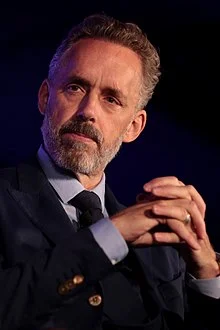
Jordan Peterson
Jordan Peterson is a Canadian clinical psychologist, cultural critic, and professor of psychology known for his influential views on psychology, philosophy, and cultural issues. Born on June 12, 1962, in Alberta, Canada, Peterson garnered widespread recognition in the late 2010s. He first rose to prominence through his critiques of political correctness and his staunch defense of free speech. His book, "12 Rules for Life: An Antidote to Chaos," became a bestseller, resonating with a global audience through its practical advice and profound insights. Peterson's academic work is extensive, with numerous papers on topics ranging from the psychology of religious and ideological belief to the assessment and improvement of personality and performance. Despite facing controversies, Peterson remains a pivotal figure, known for his thought-provoking lectures and a deep commitment to fostering individual responsibility and psychological understanding.
The Joe Rogan Experience (JRE) #1070 with Jordan Peterson: A Discussion on Society, Culture, and Personal Responsibility
In episode #1070 of The Joe Rogan Experience, Joe Rogan sits down with Jordan Peterson, a man he describes as one of his favorite human beings to converse with and a brilliant thinker. Peterson, the author of “12 Rules for Life: An Antidote to Chaos,” delves into a variety of topics, ranging from the contentious Cathy Newman interview in the UK to the profound sociopolitical implications of Marxism and postmodernism.
The Cathy Newman Interview: A Clash of Perspectives
The podcast begins with a reflection on Peterson’s controversial interview with Cathy Newman on Channel 4 in the UK. The discussion quickly becomes an examination of modern journalism’s pitfalls, particularly the tendency of television debates to prioritize conflict and sensationalism over nuanced dialogue. Rogan and Peterson criticize the interview’s confrontational nature and lack of depth in understanding Peterson’s perspective.
YouTube and the Evolution of Media
The conversation shifts towards the evolution of media, with Peterson highlighting the limitations of traditional broadcast technologies and their tendency to force narratives. He contrasts this with the rise of platforms like YouTube, which allow for more extended and nuanced discussions, thereby threatening the dominance of conventional media.
The Peterson-Newman Interview Aftermath
Discussing the aftermath of the Peterson-Newman interview, they delve into the reaction from the press and the public. They note the biased narrative that emerged, particularly in the portrayal of Newman as a victim, despite the aggressive nature of the interview.
Gender Differences and Societal Roles
A significant part of the discussion focuses on gender differences and societal roles. Peterson talks about the natural distribution of traits and preferences between men and women, emphasizing that acknowledging these differences is not equivalent to supporting gender inequality. He criticizes the current trend of denying biological differences between genders, highlighting the importance of understanding these differences in the context of societal roles and job preferences.
Marxism, Equality, and the Complexity of Hierarchies
Peterson touches on the complexity of hierarchies and the dangers of striving for absolute equality, specifically in the form of Marxism and its historical consequences. He underscores the necessity of understanding the multi-dimensional nature of hierarchies and the variability in individual success and preferences.
The Depths of Conversation – Joe Rogan and Jordan Peterson
In a captivating episode of the Joe Rogan Podcast, Joe Rogan engages in a profound conversation with the enigmatic and influential figure, Jordan Peterson. The dialogue, rich with intellectual rigor, traverses through the complexities of societal structures, the individual’s journey, and the essence of truth and responsibility.
The Complexities of Communication and Society
The conversation kicks off with a discussion about a controversial interview of Peterson on Channel 4 in the UK. Rogan and Peterson dissect the dynamics of mainstream media interviews, highlighting the often confrontational nature and the tendency to oversimplify complex narratives. Peterson delves into his experience, illustrating the stark contrast between off-camera cordiality and the on-camera persona of the interviewer, shedding light on the performative aspect of mainstream media.
The Intricacies of Gender and Society
Transitioning to a more profound societal issue, the discussion veers towards the nuances of gender differences, societal roles, and the misinterpretations often propagated by media. Peterson emphasizes the importance of recognizing the subtle but significant differences between genders, not to discriminate, but to understand the complexities of human nature. He criticizes the oversimplification of such complex issues by certain ideologies, warning against the potential dangers of legislation enforcing such oversimplified views.
Equality of Outcome vs. Opportunity
A significant portion of the conversation is dedicated to the concept of equality of outcome versus equality of opportunity. Rogan and Peterson explore the dangerous terrain of policies pushing for equality of outcome, elucidating the inherent tyranny such a pursuit entails. They argue that while equality of opportunity is a noble goal, the imposition of equality of outcome can lead to societal and moral decay, drawing examples from historical instances of socialist and communist regimes.
The Individual’s Journey and Responsibility
In the concluding segment, Peterson underscores the paramount importance of individual responsibility and personal growth. He passionately advocates for the recognition of individual identity over group identity, emphasizing the journey from being a member of a group to becoming a distinct individual. Rogan and Peterson discuss the transformational power of embracing personal responsibility, striving for individual excellence, and contributing positively to society.
